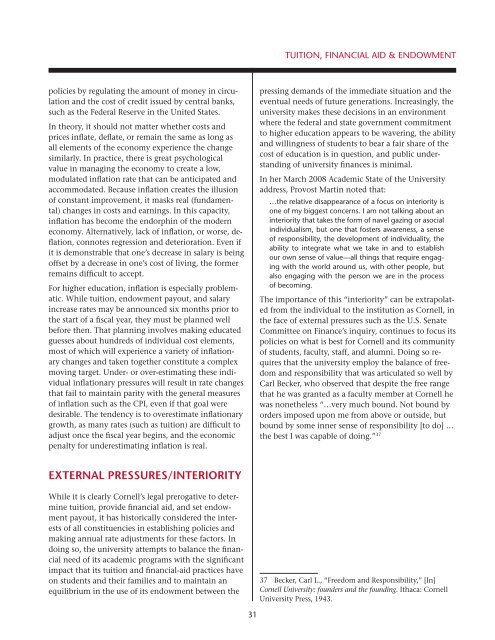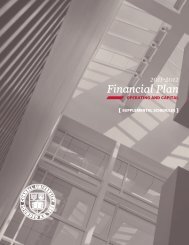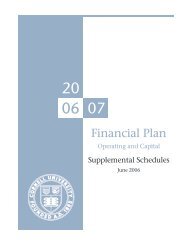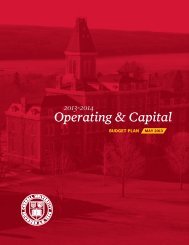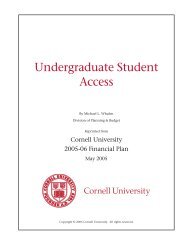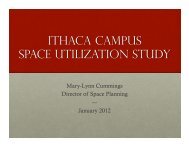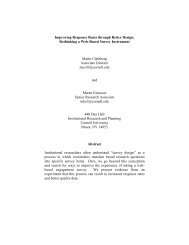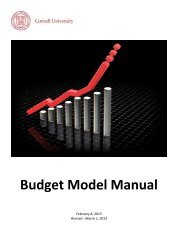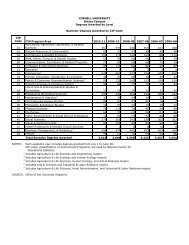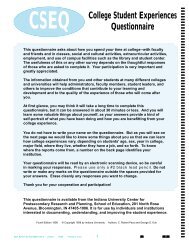Financial Plan - Cornell University Division of Budget & Planning
Financial Plan - Cornell University Division of Budget & Planning
Financial Plan - Cornell University Division of Budget & Planning
You also want an ePaper? Increase the reach of your titles
YUMPU automatically turns print PDFs into web optimized ePapers that Google loves.
Tuition, <strong>Financial</strong> Aid & Endowmentpolicies by regulating the amount <strong>of</strong> money in circulationand the cost <strong>of</strong> credit issued by central banks,such as the Federal Reserve in the United States.In theory, it should not matter whether costs andprices inflate, deflate, or remain the same as long asall elements <strong>of</strong> the economy experience the changesimilarly. In practice, there is great psychologicalvalue in managing the economy to create a low,modulated inflation rate that can be anticipated andaccommodated. Because inflation creates the illusion<strong>of</strong> constant improvement, it masks real (fundamental)changes in costs and earnings. In this capacity,inflation has become the endorphin <strong>of</strong> the moderneconomy. Alternatively, lack <strong>of</strong> inflation, or worse, deflation,connotes regression and deterioration. Even ifit is demonstrable that one’s decrease in salary is being<strong>of</strong>fset by a decrease in one’s cost <strong>of</strong> living, the formerremains difficult to accept.For higher education, inflation is especially problematic.While tuition, endowment payout, and salaryincrease rates may be announced six months prior tothe start <strong>of</strong> a fiscal year, they must be planned wellbefore then. That planning involves making educatedguesses about hundreds <strong>of</strong> individual cost elements,most <strong>of</strong> which will experience a variety <strong>of</strong> inflationarychanges and taken together constitute a complexmoving target. Under- or over-estimating these individualinflationary pressures will result in rate changesthat fail to maintain parity with the general measures<strong>of</strong> inflation such as the CPI, even if that goal weredesirable. The tendency is to overestimate inflationarygrowth, as many rates (such as tuition) are difficult toadjust once the fiscal year begins, and the economicpenalty for underestimating inflation is real.pressing demands <strong>of</strong> the immediate situation and theeventual needs <strong>of</strong> future generations. Increasingly, theuniversity makes these decisions in an environmentwhere the federal and state government commitmentto higher education appears to be wavering, the abilityand willingness <strong>of</strong> students to bear a fair share <strong>of</strong> thecost <strong>of</strong> education is in question, and public understanding<strong>of</strong> university finances is minimal.In her March 2008 Academic State <strong>of</strong> the <strong>University</strong>address, Provost Martin noted that:…the relative disappearance <strong>of</strong> a focus on interiority isone <strong>of</strong> my biggest concerns. I am not talking about aninteriority that takes the form <strong>of</strong> navel gazing or asocialindividualism, but one that fosters awareness, a sense<strong>of</strong> responsibility, the development <strong>of</strong> individuality, theability to integrate what we take in and to establishour own sense <strong>of</strong> value—all things that require engagingwith the world around us, with other people, butalso engaging with the person we are in the process<strong>of</strong> becoming.The importance <strong>of</strong> this “interiority” can be extrapolatedfrom the individual to the institution as <strong>Cornell</strong>, inthe face <strong>of</strong> external pressures such as the U.S. SenateCommittee on Finance’s inquiry, continues to focus itspolicies on what is best for <strong>Cornell</strong> and its community<strong>of</strong> students, faculty, staff, and alumni. Doing so requiresthat the university employ the balance <strong>of</strong> freedomand responsibility that was articulated so well byCarl Becker, who observed that despite the free rangethat he was granted as a faculty member at <strong>Cornell</strong> hewas nonetheless “…very much bound. Not bound byorders imposed upon me from above or outside, butbound by some inner sense <strong>of</strong> responsibility [to do] …the best I was capable <strong>of</strong> doing.” 37External Pressures/InteriorityWhile it is clearly <strong>Cornell</strong>’s legal prerogative to determinetuition, provide financial aid, and set endowmentpayout, it has historically considered the interests<strong>of</strong> all constituencies in establishing policies andmaking annual rate adjustments for these factors. Indoing so, the university attempts to balance the financialneed <strong>of</strong> its academic programs with the significantimpact that its tuition and financial-aid practices haveon students and their families and to maintain anequilibrium in the use <strong>of</strong> its endowment between the37 Becker, Carl L., “Freedom and Responsibility,” [In]<strong>Cornell</strong> <strong>University</strong>: founders and the founding. Ithaca: <strong>Cornell</strong><strong>University</strong> Press, 1943.31


